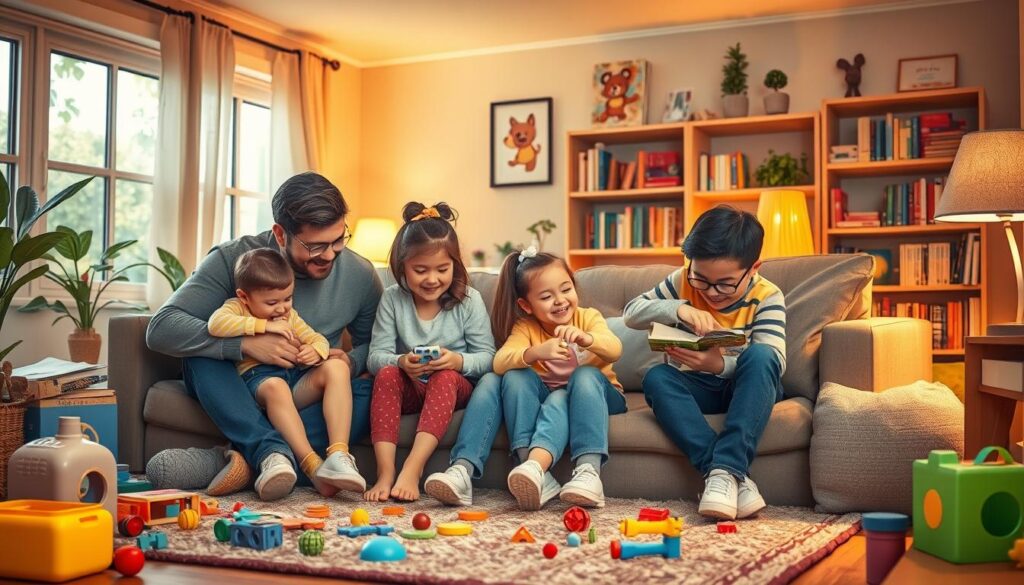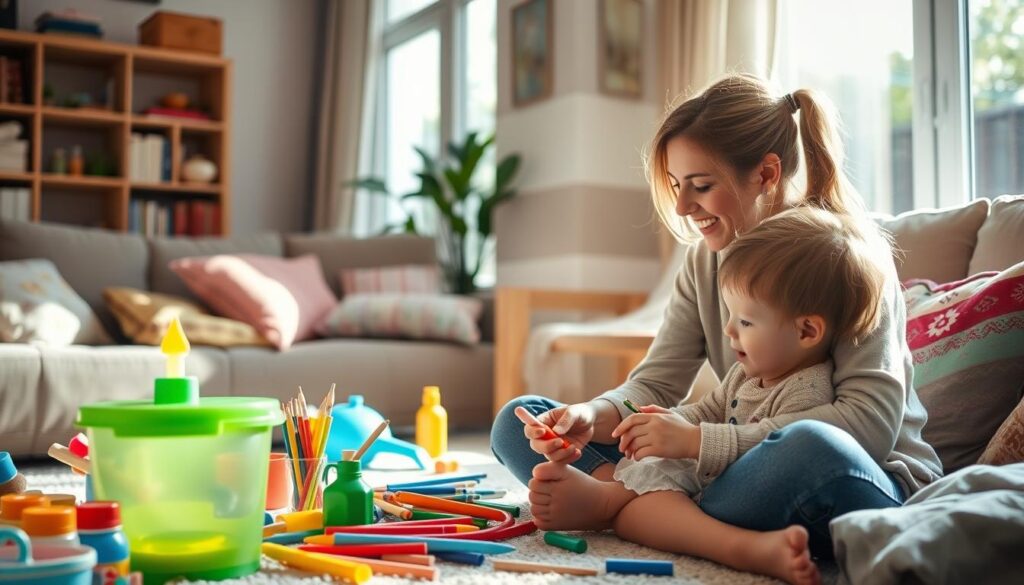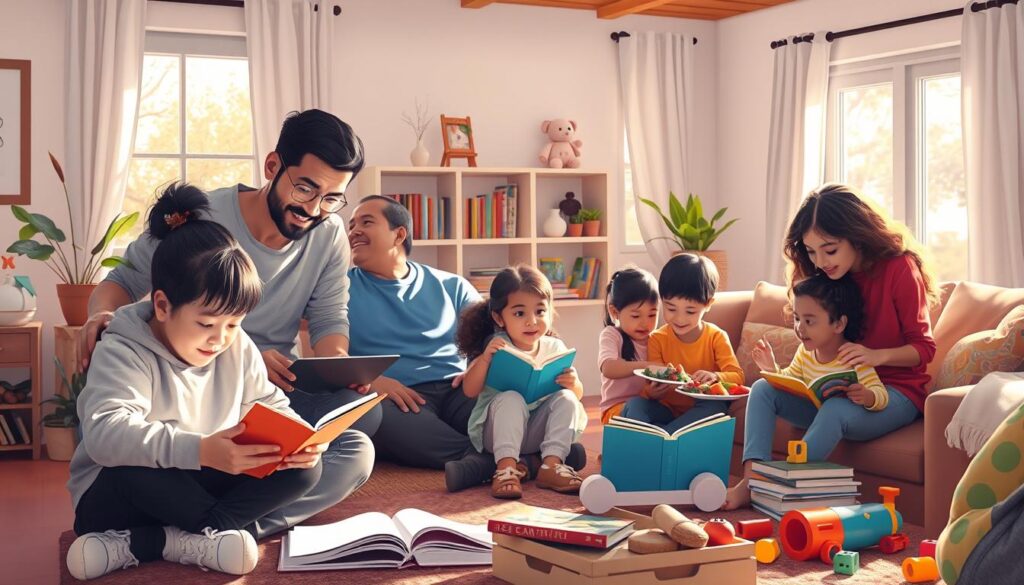I think being a good parent means more than just giving things to your kids. It’s about caring for them and guiding them in a way that fits their needs. Good parents create a loving space and set clear rules. They also take part in their kids’ lives.
What is a Good Parent !
Welcome to therubywadhwa.com
Studies have shown that good parenting is key for kids to grow up well. Laurence Steinberg, PhD, found ten important rules for parents. These rules help kids learn to be kind, honest, and strong. They also protect kids from feeling too anxious or using bad substances.
I’ve learned that every parent sees being a good parent in their own way. But we all want the same thing: for our kids to have a happy future. By helping our kids grow emotionally and socially, we can help them reach their dreams.
Key Takeaways
- Good parenting involves nurturing physical, emotional, and social development.
- Over 75 years of research highlights the principles of effective parenting.
- Positive parenting fosters virtues like empathy and self-control in children.
- Consistency in parenting is crucial for a child’s understanding of boundaries.
- Children with supportive parents are significantly more likely to succeed.
- Effective communication strengthens parent-child relationships.

Understanding Good Parenting
Good parenting means knowing what kids need and how we feel affects them. It’s about building a strong bond with our kids. I’ve learned that being a good parent isn’t just about following trends.
Research shows that being too strict can hurt moms’ mental health. But, books on supporting kids’ freedom offer better ways. I’m learning to give my kids space and freedom within rules.
It’s hard to resist the urge to be too strict. I’m trying to focus on letting kids make choices and learn to control themselves. Studies say this makes kids more eager to do things right. I believe in creating a loving, open space for kids to grow.
| Parenting Practice | Traditional Intensive Parenting | Autonomy-Supportive Parenting |
|---|---|---|
| Screen Time Regulation | Strict limits enforced | Fostering self-regulation |
| Academic Monitoring | Prioritize grades | Focus on satisfactory performance |
| Social Activities | Close oversight | Encouraging independence |
| Parent-Child Interaction | Conditional rules | Unconditional support |
| Parental Adjustment | Fixed expectations | Flexible approaches based on needs |
I’m learning to support my child’s unique self while taking care of myself. Finding a balance helps me be a better parent. This journey is full of learning and growing closer to my child.
Characteristics of Good Parents
Good parents shape their kids’ feelings and social skills. Traits like patience, empathy, and good talking skills are key. These help create a caring home. I try to be these every day because it’s so important for my child’s growth.
Patience helps us deal with tough times calmly. Empathy lets us get our kids’ feelings. Studies say 92% of good parents talk well with their kids. This makes kids feel safe and able to share their thoughts.
Setting rules and showing love is important. About 88% of good parents do this. It shows love and discipline can go together. Showing love helps kids feel and understand their emotions better.
Being a good example is very powerful. Kids learn a lot by watching us. Teaching kids to be responsible early makes them more independent. I love helping my kids try new things, making them creative and flexible.

| Characteristic | Impact on Children |
|---|---|
| Patience | Helps manage frustration and encourages problem-solving |
| Empathy | Fosters emotional connection and understanding |
| Effective Communication | Builds trust and openness in relationships |
| Setting Limits | Provides structure and a sense of security |
| Love and Affection | Promotes emotional intelligence and self-worth |
| Role Modeling | Teaches behavior patterns and life skills |
| Teaching Responsibility | Encourages independence and self-reliance |
| New Experiences | Enhances creativity and adaptability |
Knowing these traits helps me be a better parent. It’s vital to build a strong base for our kids. By focusing on these qualities, I aim to be the best parent I can be for my children.
Parenting Qualities That Matter
In my parenting journey, I’ve found some key qualities. An adaptable approach helps kids learn to be resilient. Emotional availability and unconditional love are also crucial for strong relationships.
Boosting self-esteem is important. Positive feedback helps kids feel confident. Using positive parenting tips helps my child grow and feel valued.
Reflecting back what kids say helps them talk more. It also improves their language skills. Imitating their actions makes them feel loved and builds social skills.
Describing what kids do keeps them focused and helps them learn. It also makes our bond stronger. This creates a happy place for them to grow.
Consistent discipline is also key. Explaining rules and modeling respect helps kids get along better. Kids who feel respected grow up with better mental health.
What is a Good Parent
To know what makes a good parent, we must see the value in boosting self-esteem and making a safe space for kids. Good parents always support and cheer for their children. This makes kids feel important and safe.
This support is key for kids to grow emotionally strong. It helps them feel good about themselves.
Nurturing Self-Esteem in Children
Boosting self-esteem means celebrating every little win. Parents can do this by giving positive feedback and encouragement. By spending time with kids and listening to them, we show we care.
This makes kids feel they belong and are confident. I’ve learned that praising effort, not just results, makes kids proud of themselves. It builds a strong self-esteem that lasts.
Creating a Safe and Supportive Environment
It’s vital to create a safe place for kids to grow. A supportive space lets kids talk freely without fear. This builds trust and lets them explore their interests.
Setting clear rules with love shows kids safety is important. I’ve seen kids who feel safe handle challenges better. They grow up more resilient.

Effective Parenting Skills
Good parenting skills are key to shaping kids’ behavior and feelings. Using positive communication and consistent discipline helps a lot. This way, kids feel safe and loved, and they learn to be happy and healthy.
Positive Communication Techniques
Using positive communication makes kids feel heard and loved. Listening well shows you care. When kids share their feelings, saying you understand makes them feel safe and happy.
Talking openly helps kids feel good about themselves. It makes them want to be kind to others.
- Encourage sharing: Let your child share feelings without fear.
- Validate emotions: Saying you get it builds trust.
- Use positive reinforcement: Praise good actions to encourage more.
Being Consistent with Discipline
Having consistent discipline teaches kids right from wrong. Clear rules and sticking to them helps kids learn to control themselves. Methods like the Family Chip System and the First Time Club show how to improve behavior.
| Discipline Technique | Description | Effectiveness |
|---|---|---|
| Family Chip System | Rewards good behavior with chips for special things. | Behavior gets much better in weeks. |
| First Time Club | Tracks good behavior for rewards. | Helps kids be obedient by seeing their progress. |
Studies show kids from peaceful homes are happier and do better later. Good parenting means focusing on positive actions, being consistent, and creating a caring space. As I keep learning, my goal is to make our home a place of joy and growth for my kids.
Techniques for Effective Parenting
I think it’s key to use good parenting ways to raise kids who are balanced and happy. One big part is setting clear rules for how they should act. This helps them know what’s okay and what’s not.
When I tell them the rules clearly, they learn and work together better.
Setting Limits and Expectations
Setting limits helps kids feel responsible. Talking about why we have rules makes them feel like they own their actions. Good parenting means finding the right balance between giving them freedom and keeping rules.
This balance helps them feel confident and manage their actions well.
The table below shows how setting limits helps kids grow:
| Aspect | Description | Impact on Child |
|---|---|---|
| Clear Boundaries | Establishing well-defined limits | Helps children understand acceptable behavior |
| Consistent Discipline | Applying rules consistently | Builds trust and security |
| Open Communication | Discussing rules and their importance | Encourages responsibility and dialogue |
| Positive Reinforcement | Rewarding good behavior | Boosts self-esteem and confidence |
| Flexibility | Adjusting limits as children grow | Promotes independence and decision-making |
Using these methods helps my child feel emotionally stable and grow smarter. With love and support, kids become independent and responsible. Seeing these results makes me know I’m helping them have a bright future.
Fostering a Nurturing Parent-Child Relationship
Building a strong bond between parents and children is key for their growth. It helps kids learn and feel loved and safe. When parents are warm and caring, kids feel special and protected.
Quality time with parents is very important for kids. Doing things like cooking or playing games together helps. These moments help kids talk better and learn new words in their first three years.
- Developing trust in early years encourages children to explore confidently.
- Trust and respect evolve into mutual feelings as children become older.
- Setting clear boundaries provides a sense of safety and love.
- Creating a safe space for discussions fosters openness.
- Regular one-on-one interactions lead to deeper understanding.
Having family dinners or Family Home Evenings is great. It helps families feel closer. Putting away phones and electronics makes these times special.
Effective parenting takes practice. Creating routines and being calm helps. Sharing laughs and making memories is also important.
Strengthening the bond with children is a journey. With effort and the right techniques, kids grow up confident and loved. They are ready to explore and learn.
Common Misconceptions About Parenting
As a parent, I often face many wrong ideas about parenting. These ideas can make me stressed and unsure. The idea that parents must watch their kids all the time is one of these. It makes us think we must be perfect.
Knowing these wrong ideas helps me focus on what really matters. It lets me be a good parent without being too stressed. It also helps my child and me to grow and be happy.
Beware of Intensive Parenting Culture
The push to follow the intensive parenting culture can make us very worried. It makes parents and kids feel anxious. It’s important to remember that kids will sometimes act out.
Studies show that 91% of parents think kids should learn to do things on their own. This helps kids grow up to be independent. It shows that we don’t always need to watch them.
Some people think that being strict is the only way to teach kids. But 82% of parents believe in encouraging kids more than just loving them. Experts say 93% of them agree that setting rules and consequences is key. This helps kids learn from their mistakes and grow strong.
Many think it’s wrong to want time for ourselves. But taking breaks actually makes us better parents. It’s okay to take time for ourselves because it shows we love our kids.
Positive Parenting Tips for Daily Life
Using positive parenting tips every day helps make a caring home. Spending quality time with family is key in our busy lives. Doing things together makes our bond stronger and creates memories.
Letting kids explore and learn on their own is also vital. It helps them grow up to face life’s challenges.
Making Quality Time for Family
There are many ways to spend quality time with family. Family dinners, game nights, or walks can bring us closer. Here are some ideas to spend more time together:
- Have regular family meals where everyone talks about their day.
- Do things together like gardening or cooking.
- Have a family game night to work together and have fun.
- Go on outings to see new places.
Encouraging Independence in Children
Helping kids be independent is good for them. It helps them make choices and feel good about themselves. Here are some ways to support their independence:
- Give them tasks that fit their age.
- Let them figure things out on their own, but help if needed.
- Encourage them to try new things without fear.
- Be proud of their achievements, no matter how small.
| Parenting Approach | Impact on Children |
|---|---|
| Positive Parenting | Promotes emotional regulation and resilience |
| Authoritative Style | Encourages independence and self-esteem |
| Neglectful Parenting | Can lead to behavioral problems and low self-esteem |
| Authoritarian Style | May result in rebellion and a lack of confidence |
By following these positive parenting tips, we can make memories and help our kids grow. Being a parent has its ups and downs. But seeing our kids do well makes it all worth it.
Adjusting Your Parenting Style as Children Grow
Being a parent means changing how we raise our kids as they grow. Ellen Galinsky’s research shows we need to grow with our kids. Each stage brings new challenges and chances to learn and grow together.
Being Flexible with Expectations
Changing our expectations is key. As kids move through stages, we must adjust how we guide and support them. For example, in the Authoritative Stage, we help them grow independent while keeping them safe.
In the Interdependent Stage, we help our teens be independent but still guide them. Finding the right balance is crucial. Being open to change helps us build a strong, loving relationship.
Here’s a quick summary of the major stages of parenthood:
| Parenting Stage | Typical Age Range | Key Focus |
|---|---|---|
| Image-Making Stage | Pregnancy – Birth | Envisioning parenthood |
| Nurturing Stage | 0 – 2 years | Establishing bonds; secure attachment |
| Authoritative Stage | 2 – 5 years | Setting boundaries; fostering independence |
| Interpretive Stage | 5 years – early adolescence | Teaching life skills; values transmission |
| Interdependent Stage | Adolescence | Balancing autonomy and parental guidance |
| Departure Stage | Transition to adulthood | Supporting independence |
Changing how we parent helps our kids grow and helps us face challenges together. Being open to change lets us both grow and succeed.
Conclusion
Good parenting is more than just rules and talking. It’s about making kids feel good about themselves. I need to make a safe place for my kids to grow.
Studies say dads are key to kids’ happiness. Being there for my kids is very important.
Building a strong bond with my kids is crucial. It helps them grow up well. Every time we talk or do something together, it makes them stronger.
Being a parent can be tough, but it’s worth it. By being there and learning how to be a better parent, I help my kids grow up to be strong and independent. I’m always learning and trying to do my best for them.
FAQ
What is a good parent?
A good parent loves and cares for their child. They help their child grow in body, mind, and heart. They make a safe and loving home.
What are the key characteristics of good parents?
Good parents are patient and kind. They listen well and are fair. They teach by being honest and respectful.
How can I nurture my child’s self-esteem?
To boost self-esteem, always support your child. Praise their wins and make them feel safe to talk. This builds strong feelings of self-worth.
What effective parenting skills should I develop?
Good parents talk well and listen better. They use rules that show they care. This helps kids feel understood and safe.
How do I set boundaries and expectations for my child?
Setting rules means being clear and open. Explain why rules are important. This helps kids understand and follow them.
What techniques can I use for effective parenting?
Good parenting means talking and listening together. It’s about letting kids grow on their own. Sharing moments builds trust.
How can I foster a nurturing parent-child relationship?
For a strong bond, talk openly and do things together. Support each other’s feelings. This makes your relationship strong.
What misconceptions about parenting should I be aware of?
Some think being too strict is best. But, giving kids freedom is often better. It helps them grow strong and independent.
What positive parenting tips can I incorporate into daily life?
Spending time together and letting kids be independent are key. These actions build trust and confidence.
How should I adjust my parenting style as my children grow?
As kids get older, be more flexible. Change how you guide and support them. This helps them grow into confident adults.